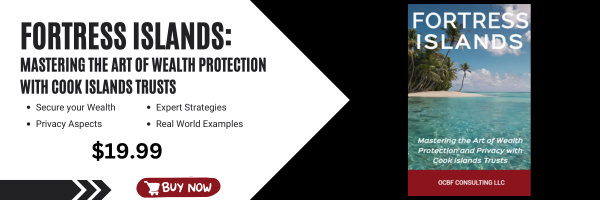Offshore Trust Inheritance Tax: A Walkthrough
As we meander through 2024, it strikes me recently how many queries I have had regarding succession planning. In particular, there has been quite an uptick in queries recently regarding the incidence of Offshore Trust Inheritance Tax and how to structure around it.
I can understand why, given the recent pandemic, there has been such a renewed interest in estate planning how and where your assets will go when you pass away. The unfortunate western reality is that governments are basically broke, having overspent for economic stimulus, and they are now very interested in finding ways to increase their tax revenues.

Subsequently, in many countries, inheritance and estate taxes are again raising their ugly head as a channel for increased taxes. This has caused quite a stampede into offshore trusts where the settlor can dictate that his final wishes are carried out.
Additionally, offshore trusts have the ability to avoid families contesting the provisions of your will. Forced heirship is a very real risk to your assets and wishes and courts in most western jurisdictions have gone out of their way to support the concept that people should be looked after out of your estate. In my opinion, only you should be able to decide where your assets go upon your death…not the state.
Offshore Trust Inheritance Tax Implications in the UK
The question as to whether an offshore trust is subject to inheritance taxes is an important one. The short answer is it very much depends on where you are based as a taxpayer. For those of you in the UK, the anti-avoidance provisions have been significantly tightened over the past few years and this complicates an inheritance for you.

Assuming you were a UK domiciled individual when you created the offshore trust, you may find that, as a beneficiary, you are still subject to tax given that they have specific laws covering settlors continuing to benefit from trust assets. However, it is less clear for those beneficiaries that were not settlors of that trust, and it very much depends on their circumstances as to whether they have to pay the UK inheritance tax above the basic threshold of GBP325k.
However, it should be noted that this depends on what assets are contained within the trust, known as the corpus. The UK-based property would likely be caught upon disposal given the UK IHT rules but, of course, if funds were not repatriated then it becomes an arguable point.
The U.S. Situation
Thankfully, the U.S. does not have an inheritance tax, but they do levy taxes on the estate assets at point of distribution. What this means in practice is that a foreign bequest or gift is likely to not be taxed given that the transfer of the trust assets occurred outside the jurisdiction.
In short, as long as the person giving you the gift or bequest is not a US citizen or a foreign national domiciled, then you should be able to avoid any form of taxes on the bequest. However, the U.S. is one of those countries where the interplay of their tax laws is incredibly complex so you would need to check and confirm whether you are potentially liable for any other types of taxes.
The Cook Islands Trust Solution

Given the U.S. situation, the Cook Islands has become a key location for asset protection trusts for US citizens. I’ve regularly set these sorts of trusts up to avoid the typical forced heirship rules in Uncle Sam. The reality is that this allows most settlors to avoid all the legal hassle of dealing with an estate distribution, taxes, and potential court action.
In fact, this is probably one of the major reasons for accessing a Cook Islands trust and not any form of tax structuring. Although the initial setup costs can be quite steep (around the US$10k mark) the savings from being, effectively, judgement proof are incalculable, and this is one way to ensure that your final bequests actually make it to their intended recipients without legal action or conversion.
Cook Island’s trusts can be rapidly established, and you have the benefit of being able to also appoint a protector to oversee the trustees and ensure that your wishes are being carried out appropriately. Normally, the trust would have two trustees, a professional trustee and the settlor or another person he dictates. This can all be achieved without the need to visit the island and simply requires the standard notarized identity and proof of address forms that you would have to provide to the trust company.
Many U.S. based attorneys can, through their contacts, form a Cook Islands trust but you are best to go with a tax specialist who can liaise directly with the trustee company on your behalf. Otherwise, I have seen extortionate bills of upwards of US$30k as every professional in the line clips the ticket.
Trust Reporting Requirements
However, be aware that there are foreign trust reporting requirements in some countries that you could run afoul of if you fail to make a disclosure. Additionally, for those savvy US persons, also be aware that FATCA requirements mean that your financial affairs globally are an open book to the IRS. The days of hiding assets are now disappearing rapidly, and it takes a much more nuanced hand to be able to structure your affairs legally.
Final Points – Offshore Trust Inheritance Tax
To answer the question of whether an offshore trust inheritance tax will be imposed really depends on what jurisdiction you are based in. Unfortunately, this is one of those questions where you really need to talk to us and highlight your specific circumstances. However, I will say it’s highly likely that we can structure an offshore trust in such a way to minimize any potential inheritance tax incidence.
Please message us if you would like a free, confidential, discussion of your specific circumstances.



Comments are closed